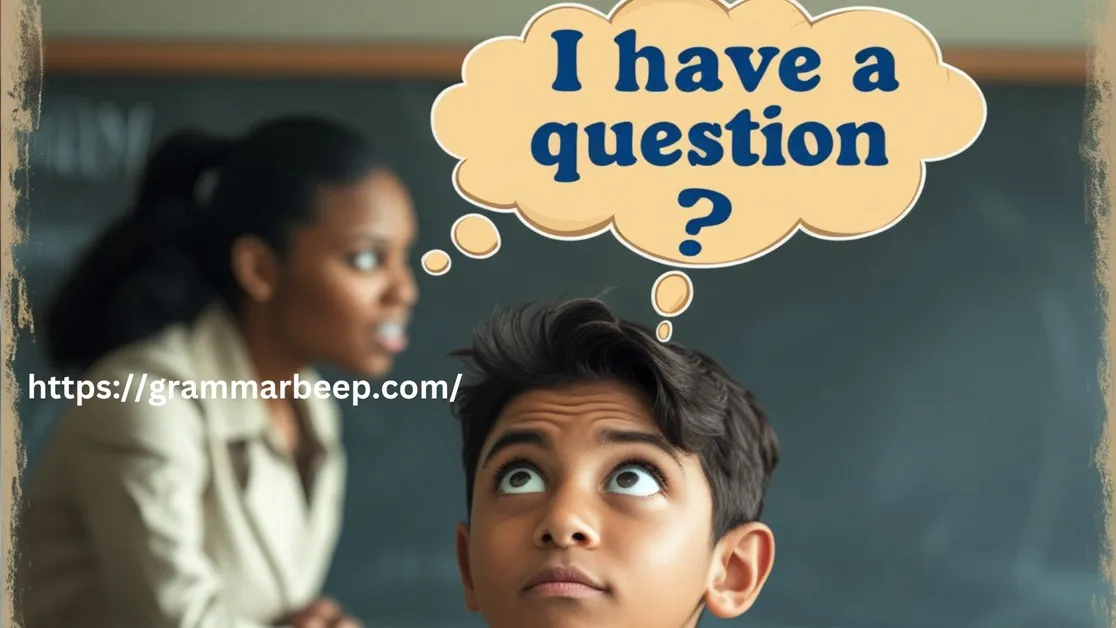In everyday conversations, saying “I have a question” can feel repetitive or too formal. With the right alternatives, you can sound more natural, thoughtful, or even friendly—whether you’re in a meeting, classroom, or casual chat.
This article shares 21 powerful ways to ask without sounding stiff or robotic. Each phrase fits different settings—some are great for classroom communication, others are perfect professional communication phrases. Along with each, you’ll find real-world examples to help you apply them confidently in any conversation. It’s all about better communication in conversations that flows and connects.
Can I ask something?
You might drop this into an email or message when you want to be casual yet polite.
Scenario (Email to Emily):
Subject: Quick Clarification
Hi Emily,
I hope your day’s going well. Can I ask something? I noticed the deadline shift in our project plan. Could you share the new timeline? Thanks a bunch.*
Best,
Alex
This phrase is a friendly invitation to engage, a great starter for casual conversation starters. It’s respectful and keeps things relaxed.
Can you clarify?
This one works wonderfully in a professional context—sharp, clear, direct.
Scenario (Meeting with Manager, Sam):
“Can you clarify the key deliverables for this quarter? I want to make sure our team meets expectations.”
It’s a polite question phrase that signals you’re paying attention. Use it when seeking clarification on details, especially during speaking in meetings or working on tight deadlines.
Check out this: 43 Other Ways to Say “Home Sweet Home”
I’m curious about…
When you genuinely want to learn more, this phrase shows phrases to express curiosity in a warm, engaging tone.
Scenario (Chat with peer, Jamie, after a seminar):
“I’m curious about how you structured your research. Could you walk me through your process?”
It invites sharing and shows you’re engaged in the conversation—perfect for classroom communication or casual learning sessions.
Would you mind elaborating?
This phrase is a gem in formal settings where courtesy matters.
Scenario (Email to Dr. Patel):
Subject: Feedback Request
Dear Dr. Patel,
Your comments on my draft were insightful. Would you mind elaborating on the methodology section? I’d love to understand your perspective more deeply.
Warm regards,
Sara
You express respect and curiosity. It fits right into professional communication phrases.
That’s interesting, can you tell me more?
Use this in dialogue to signal active listening techniques—you’re paying attention and eager for depth.
Scenario (In-group discussion with classmates):
“That’s interesting, can you tell me more about how that tool improved your workflow?”
It encourages others to expand, supports engaged conversation, and feels conversational rather than forced.
More for you: 20 Other Ways to Say “Coming Together”
I didn’t catch that, could you repeat it?
This is perfect for noisy spaces, virtual calls, or complex topics. It’s polite and clear.
Scenario (During a Zoom class with Professor Kim):
“I didn’t catch that, could you repeat the last part about the assignment?”
That’s a respectful inquiry—you’re involved but need clarity. A classic active listening technique.
Could you go deeper into this topic?
When someone hits the surface but you want more substance, this phrase helps steer the discussion.
Scenario (Workshop with trainer, Marcus):
“Your overview is insightful. Could you go deeper into this topic—especially how it applies to our case?”
It shows you’re absorbing info but still want depth. It fits well under presentation communication tips.
Can you help me understand…?
This phrase works in almost any context—kind, collaborative, and humble.
Scenario (Email to colleague, Nina):
Subject: Quick Help?
Hi Nina,
Could you help me understand the new software features? I tried exploring, but I’m stuck on the reporting dashboard.
Thanks,
Leo
When you ask this, you show respect and a willingness to learn—“show a willingness to learn” indeed.
I would love to learn more about…
Another gentle, curious approach. Use it when you want to explore ideas together.
Scenario (Conversation with mentor, Dr. Huang):
“I would love to learn more about your approach to user-centered design. Would you mind sharing some resources or your process?”
This phrase blends humility with eagerness—great for effective communication and building rapport.
For your interest: 22 Other Ways to Say “You’re Beautiful”
Is it okay to ask questions during a presentation?
This phrase is courteous and sets expectations well.
Scenario (At a conference, Q&A):
“Excuse me—is it okay to ask questions during a presentation or should I wait for the end?”
Simple, polite, and ensures smooth flow in public talks. A subtle nod to conversation etiquette.
How do I ask a question without sounding accusatory?
Use this if you’re concerned your questions might come off wrong.
Scenario (Peer feedback session with Maya):
“I’d like your feedback—how do I ask a question without sounding accusatory, especially about timeline concerns?”
That displays tact and emotional intelligence—key to cross-cultural communication and professional communication phrases.
Is it rude to ask too many questions?
This phrase shows self-awareness and sensitivity to group dynamics.
Scenario (Group discussion with Tom):
“I’m really engaged—but is it rude to ask too many questions during our progress meeting?”
You show thoughtfulness and respect for group cohesion. It highlights classroom communication or team balance.
A polite way of asking…
You can introduce a quote or hypothetical phrasing.
Scenario (Training session with new hires):
“Let me show you a polite way of asking for feedback: ‘Would you mind sharing your thoughts on this draft?’”
You teach via example, blending instruction with tone—a neat tool in communication in conversations.
Direct but polite questions
Sometimes brevity and clarity both matter.
Scenario (Email to vendor, Mr. Clark):
Subject: Urgent Delivery Update
Dear Mr. Clark,
Could you confirm whether the shipment has left the warehouse? I’d appreciate your update.
You’re firm, clear, efficient—direct but polite questions help avoid confusion or delay.
Adjust your approach depending on the cultural context
This phrase reminds us of the flexibility needed in global settings.
Scenario (Global team meeting with colleagues from Japan and Brazil):
“We should adjust our approach depending on the cultural context—maybe more formality with some, more casual tone with others.”
Acknowledging nuance strengthens cross-cultural communication and leads to more effective teamwork.
You might also like: 22 Other Ways to Say “Mother”
Maintain decorum in professional settings
This phrase speaks to tone and formality.
Scenario (HR email to all staff):
Subject: Reminder on Meeting Etiquette
Please maintain decorum in professional settings by muting your mic unless speaking and raising your hand to be unmuted.
It reinforces etiquette while staying friendly and constructive.
Show a willingness to learn
A phrase that signals openness and receptivity.
Scenario (One-on-one with your boss, Jenna):
“I want to grow in my role—could you point me toward areas where I can improve? I show a willingness to learn and take feedback seriously.”
That phrase highlights self-improvement and effective communication in personal development.
Let me pick your brain about…
Use this when you want insight from someone experienced.
Scenario (Informal coffee chat with mentor, Carlos):
“Mind if I pick your brain about managing cross‑functional teams? I’m working on something similar at my job.”
Warm, respectful, and shows admiration for the other’s expertise.
I’d like your take on…
This frames your question as seeking perspective—not just information.
Scenario (Email to peer reviewer, Anya):
Subject: Quick Input Requested
Hi Anya,
I’m refining the introduction and I’d like your take on the tone. Do you think it comes off too formal?
It’s collaborative—engaged conversation at its best.
Could you walk me through…?
Perfect when you want a step-by-step guide—not just a quick answer.
Scenario (Slack message to DevOps lead, Jason):
“Hey Jason—could you walk me through the deployment pipeline? I’d like to avoid mistakes in the next release.”
Clear, learning-focused, and person-centered.
What’s your thought on…?
Another conversational gem that invites opinion rather than just fact.
Scenario (Team chat with Mia):
“What’s your thought on the budget proposal as it stands? I want to ensure we’re aligned before finalizing.”
It opens dialogue and includes others in decision-making.
Synonyms for “I Have a Question”
| Phrase | Tone/Use Case |
|---|---|
| Can I ask something? | Casual, friendly |
| Can you clarify? | Formal, clear |
| I’m curious about… | Curious, conversational |
| Would you mind elaborating? | Polite, formal |
| That’s interesting, can you tell me more? | Engaged listening, conversational |
| I didn’t catch that, could you repeat it? | Respectful clarification |
| Could you go deeper into this topic? | In-depth inquiry, formal/neutral |
| Can you help me understand…? | Collaborative, learning tone |
| I would love to learn more about… | Curious, positive |
| Is it okay to ask questions during a presentation? | Presentational etiquette |
| How do I ask a question without sounding accusatory? | Tactful, reflective |
| Is it rude to ask too many questions? | Thoughtful, group-aware |
| A polite way of asking… | Instructional, relational |
| Direct but polite questions | Clear, efficient |
| Adjust your approach depending on the cultural context | Global awareness |
| Maintain decorum in professional settings | Formal, guidelines |
| Show a willingness to learn | Humble, growth-oriented |
| Let me pick your brain about… | Informal mentorship tone |
| I’d like your take on… | Inclusive, conversational |
| Could you walk me through…? | Procedural, cooperative |
| What’s your thought on…? | Opinion-seeking, collaborative |
FAQs
What’s a casual way to ask a question in a group chat?
You can say “Mind if I ask something real quick?” to keep it light and friendly.
Can I use these phrases in customer service emails?
Yes, especially options like “Would you mind elaborating?” or “Can you help me understand…” to sound helpful and polite.
Are these alternatives suitable for job interviews?
Absolutely—phrases like “I’m curious about…” or “Could you walk me through…” show professionalism and interest.
Do these expressions work in written communication?
Yes, all of them fit emails, messages, or reports—just adjust the tone to match your audience.
Which phrase works best when you’re new in a workplace?
Try “I would love to learn more about…” to show eagerness without sounding unsure.
Conclusion
Learning different ways to say “I have a question” makes your speech and writing more flexible and engaging. These expressions help with active listening techniques and show you care about the person you’re speaking to.
Use the phrases that match your setting. Whether you’re at work, school, or chatting with friends, there’s a right tone for every moment. With better conversation etiquette and smarter wording, you make your questions easier to hear—and easier to answer.

Zoey Alba is an experienced blogger and language enthusiast with a passion for helping readers master the art of grammar. With years of expertise in writing, editing, and content creation, Zoey shares practical tips and insightful advice to make grammar accessible for all. When she’s not writing, Zoey enjoys reading, learning new languages, and inspiring others to write with confidence.
